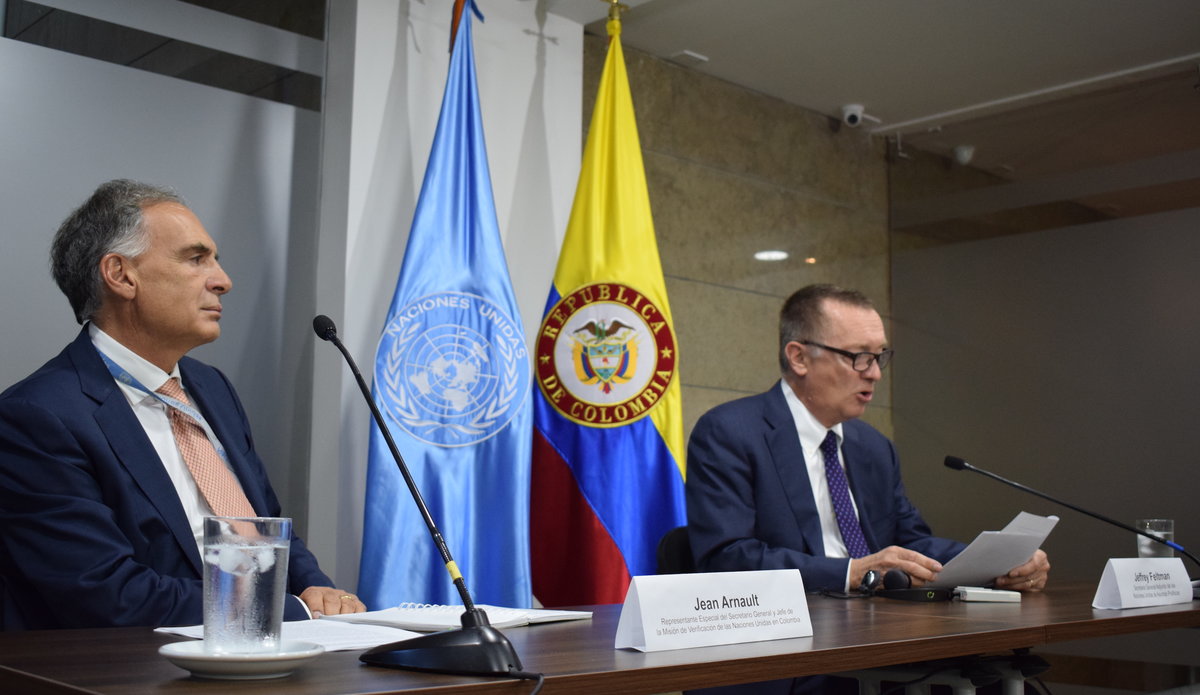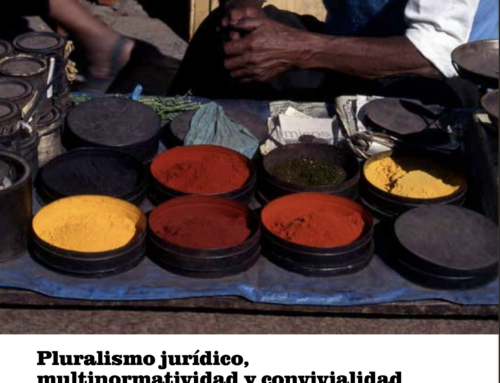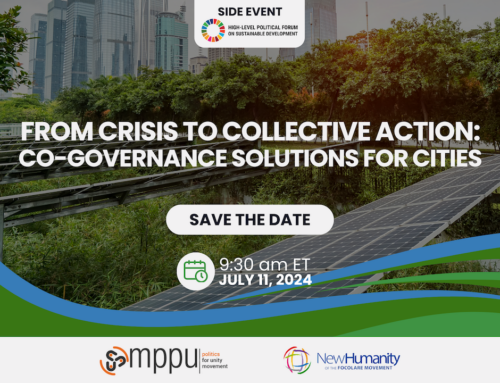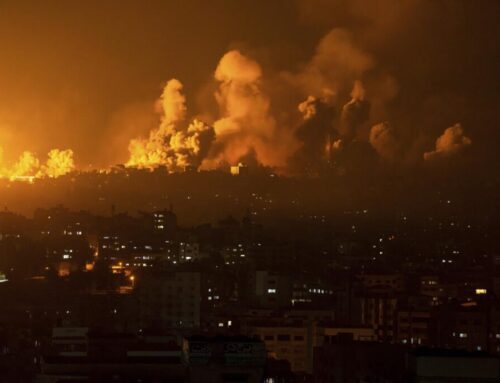15 Nov 2017
UN Verification Mission in Colombia: Opening remarks to the press by United Nations Under-Secretary-General for Political Affairs Jeffrey Feltman.

Bogota, 15 November 2017. Good afternoon. I wanted to make a few remarks publicly as I conclude this visit, which is the fifth time that I have been to Colombia over the past two and half years. As always, I appreciate the warm reception received by everyone who gave of their time to meet with me and to share their insights on the peace process and their recommendations for the United Nations.
Since arriving on Monday night, I have had meetings with President Santos and members of his cabinet and peace team, including the High Commissioner for Peace, the High Counsellor for Post-Conflict and the Minister of Defense. In addition, I remain in close contact with the Foreign Minister, who was away from Colombia this week, and with Colombia’s Permanent Representative to the United Nations in New York. I also met here with senior leaders of FARC, Ivan Marquez and Pastor Alape, as well as with the ambassadors of the guarantor countries, Cuba and Norway, with the European Union and several other countries who have a strong interest in the peace process. I spoke with delegates of the International Committee of the Red Cross, with the Organization of American States and with representatives of civil society on the National Commission for Security Guarantees. And of course, I relied in particular on discussions with SRSG Arnault and his team in the Verification Mission, as well as with UN Resident Coordinator Martin Santiago and the representatives of a number of UN agencies, funds and programmes.
When I was last in Colombia, toward the end of June, it was a different moment in the peace process. The laying down of arms of the FARC to UN monitors was well underway in the zones and points where the group had concentrated its forces in observance of the cease-fire agreement. I visited the zone in Pondores, in La Guajira, where I witnessed the storage of FARC arms in UN containers. I also saw those same FARC combatants receiving the certification of having laid down their weapons, which qualified them for the opportunities of reinsertion into civilian life.
The successful completion of this laying down of arms just three months later was, without doubt, a major milestone in Colombia’s transition from war to peace. This was an achievement that signaled to the country and to the world that the armed conflict with the FARC was over.
I stated at that time that I was “profoundly impressed” by what had been achieved by the parties. This was not just a personal assessment. I was reflecting the admiration of the United Nations as a whole, and in particular of the Secretary-General and the Security Council, for all that has been achieved thus far.
High hopes and expectations continue to be placed on Colombia’s peace process. There is immense goodwill in the international community. This said, I arrived this week, at the request of the Secretary-General, to convey a sense of growing concern about how the peace process has been evolving over the past several months. These are concerns of which Colombians working within the peace process and those following it internationally are well aware. They relate in particular to three key issues that are central to the early implementation of the peace agreement and to the mandate of the UN Verification Mission:
– First, the state of reintegration of former FARC members. Reintegrating former fighters is a difficult prospect in any post-conflict situation. Success in the context of Colombia demands the development and implementation very quickly of opportunities that provide former fighters, including women, with an alternative that is attractive and distinct from that which may be on offer from illegal economies and other armed groups that could pull some number of them back into illegality. However, despite a range of commendable activities underway from the Government, the FARC itself and the international community, we are concerned at the lack of an overall strategy for reintegration matched by concrete plans and resources to enable its success. We believe efforts on a larger scale are needed, including by providing land for productive projects. The drifting of a number of FARC members out of the zones, for a range of reasons that include joining the so-called “dissidents”, is a troubling sign of what could be the result on a wider scale if reintegration efforts are not very substantially accelerated.
– Second, the situation of security in the former conflict zones, particularly those areas that have been vacated by FARC in the course of their laying down of arms and conversion to an unarmed political movement. We share the deep concern about the reported vacuums of authority in many of these areas and the resultant insecurity for communities as other illegal groups move in to fill the void. This is the context in which we continue to see killings of social leaders and some former FARC members, and where authorities have themselves confirmed rising levels of violence. We saw this tragically last month in Tumaco, and I was saddened to learn of the killing, just in the past several days, of a former FARC member in Antioquia and of two community leaders, one in Nariño and the other in Cauca. We do recognize the effective operations to secure the areas around the ETCRs and the many responsibilities resting on the shoulders of the state security forces; however, we believe that more needs to be done very quickly to assert effectively state authority, by public security forces and civilian state institutions alike, in the former conflict zones.
The experience globally in peace processes shows that it is vital in the immediate aftermath of an agreement to establish basic security in the post-conflict, to bring visible improvements to communities, and to get the reintegration of former combatants right. The consequences of failure to achieve those basic objectives are very high. In Colombia, such a failure would make it extremely difficult to achieve the broader objectives of the Final Peace Agreement in terms of developing the countryside, improving governance and respect for human rights, assisting and ensuring the rights of victims, broadening participation, especially by women, and combatting the illicit economies.
– A third point of concern has been the legal uncertainties, particular as they affect members of the FARC, resulting from delays in approval of key legislation and the ongoing judicial review of a number of previously adopted measures — especially the Special Peace Tribunal and the Amnesty Law, which was adopted nearly a year ago. We hope that following yesterday’s decision by the Constitutional Court on the Tribunal, Congress can now move quickly to adopt the implementing legislation and other important measures while fast-track powers remain in effect. This would only be consistent, in our view, with the decision of the same Parliament to ratify the peace agreement one year ago.
In this context, I would like to stress something that President Santos spoke of in his address to the nation last night. We, too, have been particularly concerned about talk of the closing off of the avenue provided in the peace agreement to political participation by FARC. What I can say, from the United Nations’ extensive experience in the settlement of internal armed conflicts globally, over many decades, is that the decision by insurgents to forego armed violence in order to pursue peaceful democratic politics is the very heart of the matter. It is the deal, and it is at the center of the peace agreement. The failure, following the laying down of arms, to deliver on this essential compromise would have very serious repercussions for the process and would not be understood or accepted by the international community.
We recognize that the peace process is subject to legitimate debate in the country. However, our appeal to all of Colombia’s institutions, parties and to the public at large is to appreciate that, independently of one’s views about different aspects of the Peace Agreement, all surely can see the interest in ensuring that former combatants are absorbed productively into legal civilian life. All surely can also see the national interest in ensuring that regions which for more than five decades have been besieged by lawlessness, violence and under-development are now stabilized and integrated fully into the economy and governance. It is our strong view that this can be achieved by the robust implementation of the Peace Agreement.
My discussions over the past two days confirmed that these concerns are not only of the UN, but rather are shared widely. There is a common assessment that more must be done to ensure that the remarkable gains of the first phase of the peace process are maintained. I heard calls across the board to invigorate the reintegration process and to move more decisively to stabilize the former conflict zones with a mixture of a greater preventive presence of the security forces and of civilian state institutions.
I appreciate the very clear statements I heard from President Santos and officials of the government and other state authorities, as well as by the FARC, of their commitment to overcoming obstacles. We listened carefully to, and were encouraged by, the President’s address last night.
Let me also state how strongly we welcome the initial assessments that the cease-fire with the National Liberation Army (ELN) has been broadly complied with to this point. We hope that the parties can come to a timely decision on its extension past the 9th of January, and to communicate that as soon as possible to the Security Council.
I return to New York tomorrow, and will have the opportunity to share the observations from this visit with the Secretary-General. He and the Security Council are following closely what is happening in the peace process. The next report of the Secretary-General to the Security Council on the mandate of the Verification Mission is due on the 26th of December. That is still more than a month from now, and it is our hope that by the time that report is finalized it can include the most positive assessment possible. This would be a sign that the next stages of the peace process are resting on solid ground, and would therefore give further confidence to the international community that has been so optimistic until now, and so committed to seeing that it succeeds.
In conclusion….as if often said, implementation is even more difficult than negotiation. Our call is for Colombians to stay the course set out in the Peace Agreement.





Leave A Comment